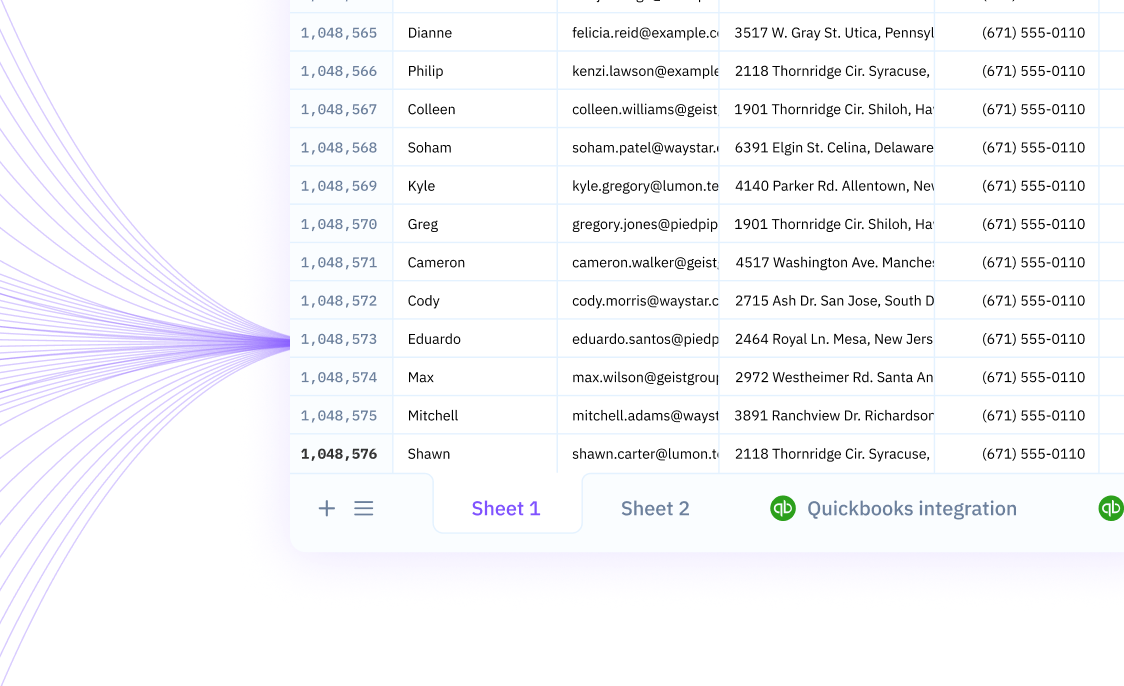
Export Colab to CSV

Overview
Welcome to our comprehensive guide on exporting data from Google Colab to CSV files, a valuable skill for data scientists and analysts who wish to share, analyze, and collaborate on data more effectively. By converting Colab notebooks into CSV format, users can leverage the simplicity and compatibility of CSV files to easily load data into spreadsheets and various data analysis tools. In this guide, we will explore what Google Colab is, the step-by-step process of exporting your data frames to a CSV file, practical use cases for this method, an alternative approach using Sourcetable, and a helpful Q&A section to address common inquiries about the process.
What is Colab?
Google Colaboratory, or Colab, is a hosted Jupyter notebook service that provides free access to computing resources and is well-suited to machine learning, data analysis, and education. As a product from Google Research, Colab allows users to write and execute Python in their web browser with zero configuration required, free access to GPUs, and easy sharing.
Colab notebooks are stored in Google Drive and can be shared just like documents in Google Docs. This service is aimed at simplifying the process of working with machine learning tools and data sets, and it is designed to promote collaborative projects in the field of education and research.
While Colab is a free service, it does come with limitations. Resources are not guaranteed and are not unlimited. Activities may be terminated without warning, particularly those that bypass its anti-abuse policies. Colab also offers options such as Colab Pro, Pro+, and Pay As You Go for users who require more resources or increased compute availability.
Exporting Data from Colab to CSV
Saving Dataframes as CSV
You can export dataframes created in Google Colab into CSV files by utilizing the pandas library's to_csv method. This is done by calling df.to_csv('filename.csv') on the dataframe you wish to save. This line of code converts the dataframe into a CSV file with the specified filename.
Downloading CSV Files to Local Computer
After saving the dataframe as a CSV file, you can download it to your local computer. This is achieved by using the Google Colab files functionality. Simply execute files.download('filename.csv') to initiate the download of the CSV file you created.
Downloading CSV Files to Google Drive
To save your CSV files directly to Google Drive, you need to first install PyDrive by running !pip install -U -q PyDrive. Once installed, you can authorize and create a connection to Google Drive, list the files and folders, and upload your CSV file using file.Upload(). Make sure to save the dataframe with df.to_csv('mydataframe.csv', sep='\\t') if you want to specify a tab separator, and use the code snippet provided to find the ID of the folder where you want to save your file in Google Drive.
Streamline Your Data Analysis with Sourcetable
With the advent of powerful data processing tools, efficiency and seamlessness in handling big data have become paramount. Sourcetable offers an innovative solution by syncing your live data from a myriad of apps or databases directly into a spreadsheet environment. This means you can bypass the traditional method of exporting data from Colab to a CSV file and then importing it into another spreadsheet program. The integration of Sourcetable significantly simplifies the workflow for users who manage and analyze data on a regular basis.
The benefits of using Sourcetable over conventional CSV export are numerous. Firstly, it facilitates real-time data synchronization, ensuring that your spreadsheet contains the latest information without the need for manual updates. This live connection to your data sources not only saves time but also reduces the potential for errors that can occur during the transfer process. Furthermore, Sourcetable's familiar spreadsheet interface allows users to query and manipulate data with ease, making it an excellent tool for automation and enhancing business intelligence capabilities.
Common Use Cases
-
Data analysis results need to be shared with non-technical stakeholdersC
-
A machine learning models output must be saved for external evaluationC
-
Exporting a dataset for further processing in a different softwareC
-
Backing up the progress of data manipulation tasksC
-
Transferring data between different Google Colab notebooksC
Frequently Asked Questions
How can I export a pandas dataframe to a CSV in Google Colab?
Use the df.to_csv('filename.csv') function to save the dataframe as a CSV file. Then, use the files.download('filename.csv') function to download the file to your local computer.
Is it possible to directly save a dataframe to Google Drive from Colab?
Yes, you can save a dataframe to Google Drive by using the PyDrive library. First, install PyDrive using !pip install -U -q PyDrive, then authenticate with GoogleAuth, create a folder in Drive, and use df.to_csv('path/to/folder/filename.csv') followed by file.Upload() to save and upload the file to your Drive.
Can I download files other than CSV from Google Colab?
Yes, you can download any file type using the files.download('filename.extension') function, replacing 'filename.extension' with the appropriate file name and extension.
Do I need to save the CSV file before downloading it?
Yes, you need to use df.to_csv('filename.csv') to save the dataframe as a CSV file to the virtual machine before you can download it with files.download('filename.csv').
How do I authenticate to Google Drive when using PyDrive in Google Colab?
Authenticate to Google Drive by running GoogleAuth to get the necessary permissions before you can upload files using PyDrive.
Conclusion
Exporting data to CSV from Google Colab is a straightforward process that can be achieved through several methods. You can use df.to_csv to export a dataframe and then download it to your local machine with files.download, or alternatively, save it directly to your Google Drive using PyDrive utilities such as drive.CreateFile and file.Upload. For a more integrated experience that bypasses the need for manual exports, consider using Sourcetable to import your data directly into a spreadsheet. Sign up for Sourcetable to streamline your data management and get started with a more efficient workflow.


